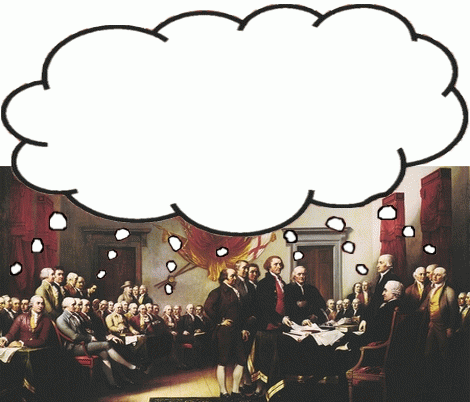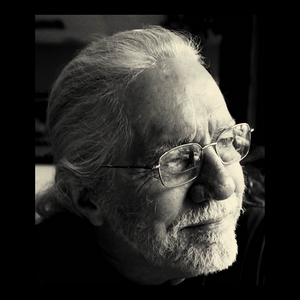
What WERE the Framers thinking as they signed the Founding Documents?
(Image by John Trumbull, 1818 (derivative)) Details DMCA
You don't have to be a constitutional scholar to see how our founding documents have been kidnapped by conservatives. Court appointments are a key strategy in this ideological abduction, and a seat on the Supreme Court is the grand prize. Neil Gorsuch is the nominee to fill the long-vacant seat. And he passes the new litmus test used to serve conservative ideology, qualifying as a candidate like Antonin Scalia - a constitutional originalist. You may hear this phrase a lot in the coming months, and we need to understand what it really means.
Like conservatism itself [1], originalism is often accorded a sacred place in the Republican lexicon. Let's take a look at what it means, where it came from, and how it has become a useful tool for the radical right. Only then can we make sense of the pseudo-intellectual logic behind the concept by probing some examples.
Paul Brest defines originalism as, "...the familiar approach to constitutional adjudication that accords binding authority to the text of the Constitution or the intentions of its adopters." [2] Brest is a Professor Emeritus at Stanford Law School, and more importantly, he's the guy who coined the term. Breaking it down, he's saying that the law must not only follow the words of the Constitution, it must also conform to what the framers were thinking.
The framers themselves didn't give us any such guidance. In fact, originalism wasn't even conjured up until at least 1980 - yeah, it's that new - and it didn't rise to its place in right-wing orthodoxy until even more recently. But its gestation took place during 1980s. Originalism - like conservatism, trickle-down economics, and runaway inequality - is America's nightmare legacy of the Reagan years.
Originalism rests on the wobbly foundation of anti-modernism - one of the ten pillars of conservatism penned in 1987 by Russell Kirk. He says, ",,,modern people are dwarfs on the shoulders of giants, able to see farther than their ancestors only because of the great stature of those who have preceded us in time." [3] If we view America's founders as the very giants to whom Kirk refers, who are we to question their wisdom?
Clearly, originalism and conservatism are close allies. And both have been co-opted by the controlling interests of the Republican Party to promote the agenda of economic concentration and political control. Corporations and the very wealthy - big-money interests - have worked hard for centuries to lay down the rules of western economies and governments to serve their own purposes. And they don't want reformers messing up their work; they want to keep things pretty much as they are.
If you agree that originalism has become a tool of the big-money interests, how on earth can they pass it off as something that benefits regular people?
- They claim that it protects people against the "passion of the times" - a bulwark against revolution.
- They claim that it makes the government accountable to the people.
- They claim that it protects us against a government that grows beyond the limits imposed by the Constitution.
- They claim that it protects us by limiting the power of the courts. [4]
But wait - these things are just excuses to keep things as they are. Consider the antitheses.
- If passion can be thwarted, change can be averted.
- Few of our elected officials are accountable to the people rather than to their own benefactors.
- Smaller government just might be easier for big-money interests to control.
- Limiting the courts can prevent legal challenges that might threaten the status quo.
So if originalism has been co-opted by big-money interests, should we reject the principle entirely? There's nothing wrong with trying to understand what the framers were thinking. It's not really that hard to do, especially if we follow a few simple ground rules. We need to understand the words themselves, of course. Then we need to understand how the words relate to the context of other words in the Constitution and to contemporary writings of the time. We need to understand how the economy worked in 1787-to-1789, and how it drove political power. We need to understand the historical events leading up to the framing of the Constitution. Most of all, we need to recognize that the framers were not gods - and if they themselves were standing on the shoulders of giants, they were also shattering the dogma of the ancients.
Clearly, our legal judgments cannot be driven exclusively by how we view the intent of the framers; they could not see into the future in which we live. They lived in a world of institutionalized generational slavery; a world without political parties; a world in which native uprisings and slave revolts were the gravest internal threats; a world in which no standing army protected us; a world in which leeches were a medical necessity; and a world in which weeks were required to convene an electoral body.
So, considering the literal and historical context of the late eighteenth century, and considering the limitations of the framers, let's apply some critical thinking to a few examples and identify the winners and losers. Does originalism - right or wrong - really support the positions of big-money interests and conservatism in general, or is it merely a justification for self-serving policies? In subsequent installments, we'll examine the Electoral College, our freedom of speech, and our right to bear arms. Conservatives will be (clickbait alert...) ENRAGED at #3!
[1] click here
[2] click here
[3] click here
[4] click here
(Article changed on February 23, 2017 at 22:01)




